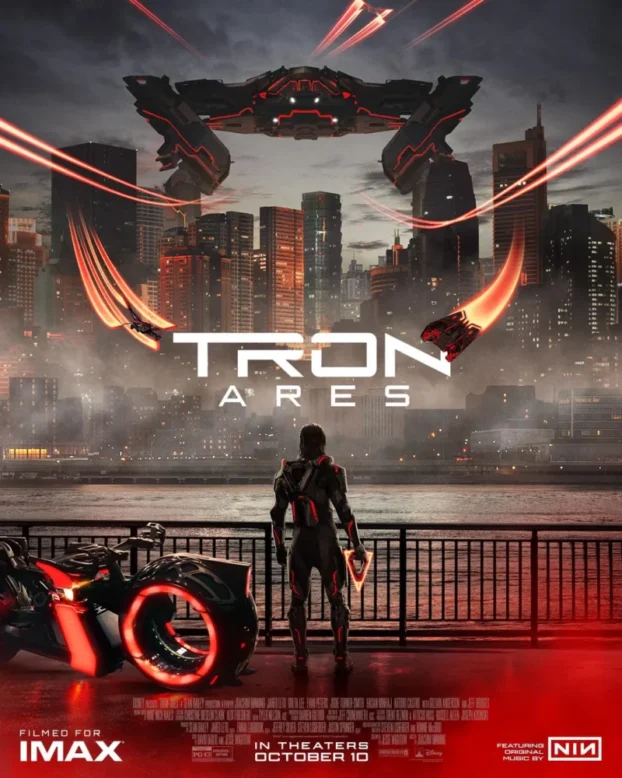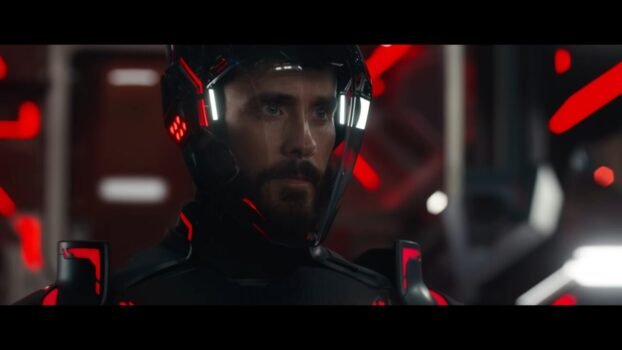It’s been quite a while since Tron: Legacy premiered in theatres (15 years, to be exact). It’s been even longer since the original Tron in 1982. To prepare for Tron: Ares, the third installment in this slow-going series, I read up on the Wikipedia synopses of the first two films. I thought that I would need a refresher on what came before. Turns out, all I really needed to know was told to me in the first few opening moments of the film. The movie takes a simplistic approach, barely building on the events of its predecessors, although there are a few easter eggs for those who watch closely.
Indeed, simplicity is the name of the game here, as the script for Tron: Ares and the characters in said story can mostly be boiled down to archetypes. It’s hard to argue that you’ll grow to care for these characters much. But the worlds that these people (and programs) find themselves in, as well as the action scenes they inhabit, make for an exhilarating and entertaining ride.

Reboot
Tron: Ares takes place fifteen years after Tron: Legacy and mostly disregards the plot developments of that film. New characters are at the forefront this time, with ENCOM chief executive officer Eve Kim (Greta Lee) and her partner Seth Flores (Arturo Castro) racing against Julian Dillinger (Evan Peters) the grandson of Ed Dillinger, the antagonist of the first film. Both parties are attempting to recover Kevin Flynn’s “permanence code,” a digital line of code that allows transmitted beings from the Grid to exist in the human world permanently.
Eve and Seth want to use it to solve problems of world hunger and to sustain humankind. Julian wants to make weapons of war. At the center of Julian’s plan is a new program, Ares (Jared Leto), who Julian showcases to war executives as the newest, greatest war machine. Ares exists as the Master Control Program in the Grid world, and in our space, he’s equally powerful. Of supreme intelligence and physical capability, Ares is near unstoppable. If he gets struck down, Julian will simply transfer over another into the world.

There are two problems with Julian’s plan. First, the lack of the “permanence code” only allows Ares to exist in the human world for 29 minutes. Secondly, Julian doesn’t expect Ares to grow a conscience…
On the Fringes
The characters and overall plot in Tron: Ares are on the simple and predictable side. The good guys want to solve human problems, the bad ones want to exacerbate them. Our antagonist, Julian, doesn’t get much more development than that he’s simply power hungry, wanting to secure the top spot for himself. Evan Peters delivers his craziness and hyper energy well, but a developed character this is not.
Julian’s mother, played by Gillian Anderson, delivers a much more even-keeled performance, from a much more reasonable character. It’s easy to see that she loves her son, and when she sees him going off the rails, will attempt to reel him back in.

There is an A.I. program named Athena (Jodie Turner-Smith) who exists as second in command to Ares. She primarily serves as an antagonist in the second half of the film. She doubles down on her mission to retrieve the “permanence code” at any cost. As such, she doesn’t question her motivations until fairly late in the story.
On the hero side of the spectrum, there’s Ares. The script doesn’t demand that much of Leto, who mostly goes through the motions until he gains more self-awareness. Even then, this isn’t that memorable of a performance. There aren’t many emotional highs or moments of authentic emotion for Ares. Furthermore, the character’s arc did nothing to surprise me. Although I am a fan of the A.I. growing sentient trope, nothing new is done here.
Eve Kim’s character, however, is developed further. Her development relates to her sister, who starts the story off deceased and gains further relevance as the storyline progresses. Eve’s friends and colleagues are barely given any character at all; I struggle to remember what their names even are.
But We’re Still Invested
While you won’t get to know or care deeply for these characters, surprisingly, their lack of development doesn’t detract from the action. I saw Tron: Ares in 3D, and that was definitely the right choice to make on my part. The Grid world is still a breathtakingly awesome and powerful sight in its overall scope, and the fights that take place there are no less so.

Tron: Ares sells itself on the digital world existing in the physical one. This aspect of the movie delivers consistent thrills, with my favorite action scene taking place on Light Cycles in a fictional version of Vancouver. The final battle also exists in the physical world.
Permanence
If I do remember Tron: Ares several years from now, that’s what will permanently stay in my mind: the action and special effects. In that way, it’s not so different from previous Tron films, which it also takes many of its plot ideas from. I enjoyed Tron: Ares for what it was, a solid action film whose characters and themes mostly exist to uphold the structure of that action. It’s not going to win any accolades for writing, but I still had an okay time with this one. Tron: Ares receives a
Score: 6.5/10
Tron: Ares is now playing in theaters nationwide.
You might also enjoy:
‘Derelict’ is an Intricately Powerful and Poignant Story About Cycles of Violence
Mayhem Film Festival: gazing into the abyss with Woody Bess
Authenticity in the Films of Cameron Crowe




